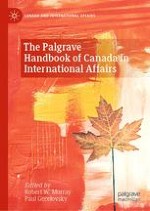2021 | OriginalPaper | Chapter
14. Countering Violent Extremism in a Changing World Order: Devolution Within Canada’s Multilateralist Approach
Authors : John McCoy, David Jones, Zoe Hastings
Published in: The Palgrave Handbook of Canada in International Affairs
Publisher: Springer International Publishing
Activate our intelligent search to find suitable subject content or patents.
Select sections of text to find matching patents with Artificial Intelligence. powered by
Select sections of text to find additional relevant content using AI-assisted search. powered by
